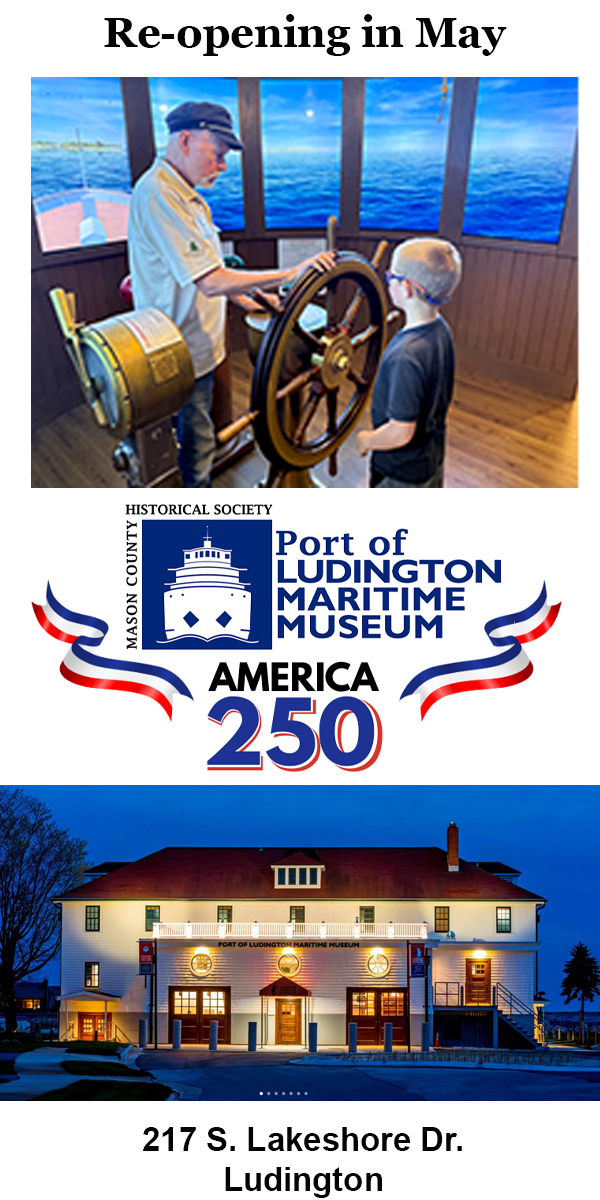
Griffin Bartscht surveys fish
This Great Lakes Boat Blog is presented by Hankwitz Heating & Cooling, 609 S. Washington Ave., Ludington; 231-843-2809.
By Mark Varenhorst, MCP Contributor
We all enjoy our time on the lakes and rivers in Michigan. Many groups or organizations take part in maintaining and protecting the waters of Michigan. Many of us are well aware of the Michigan Department of Natural Resources, U.S. Fish and Wildlife Service and many others. Along with those and in partnership with them are the five tribes, Little River Band of Ottawa Indians (LRBOI), Little Traverse Bay Band of Odawa Indians, Grand Traverse Band of Ottawa & Chippewa Indians, Bay Mills Indian Community and Sault Ste. Marie Tribe of Chippewa Indians.

Tina VanDoornik operates the boat
Tina VanDoornik is a Great Lakes fisheries biologist working in the Natural Resources Department, Fisheries Division for the LRBOI with her office located in Manistee. She supervises and works with the team that works and maintains the Namaycush, their vessel that goes out into Lake Michigan. They monitor fish. noting size, weight, age, sex and depths found at etc. The boat normally operates with a crew of three, Tina being the biologist in the crew with two Great Lakes fisheries technicians working with her. Their season begins in May and has three main surveys including lake-wide assessment plan in the spring, fisheries independent white-fish survey in the summer and spawning assessment survey in the fall.
VanDoornik came to Manistee and the LRBOI following an interesting journey. She came out of Michigan State University as an undergraduate in zoology. She then earned a master’s degree at the University of Miami in Florida. Following that she worked for the State of Florida doing offshore reef fish monitoring. In 2022, she came to work for LRBOI, the role she currently holds at this time.
I boarded the Namaycush in Ludington when the team was going out to set its two nets for its survey. Having never seen any of this done I was amazed at the amount of work involved and the precision with which the crew placed the nets and retrieved them the following day, when I also accompanied them. They placed two 1,800 foot graded mesh nets along with anchors and a buoy at each end. One was in approximately 70 feet of water and the second one deeper at approximately 120 feet. On the first day Tina managed the boat, and the Great Lakes fisheries technicians managed things in the back of the boat, those being Conner Johnson and Griffin Bartscht.
I did my best to stay out of the way as I took notes and pictures. Not an easy thing to do when the boat is moving up and down and sideways all at once. VanDoornik used GPS to place the nets properly and gave the commands of when to deploy each part of the nets.
 Conner Johnson is from Iowa and now resides with his wife in Ludington. I joked with him on how he found himself on a boat on Lake Michigan having come from Iowa. Not a lot of large bodies of water like the Great Lakes in Iowa. That got a chuckle from both of us. Johnson graduated from Lake Superior State University in 2021 with a degree in fisheries management. He came to Ludington in 2022 and has been with the LRBOI Natural Resources Department for three and a half years.
Conner Johnson is from Iowa and now resides with his wife in Ludington. I joked with him on how he found himself on a boat on Lake Michigan having come from Iowa. Not a lot of large bodies of water like the Great Lakes in Iowa. That got a chuckle from both of us. Johnson graduated from Lake Superior State University in 2021 with a degree in fisheries management. He came to Ludington in 2022 and has been with the LRBOI Natural Resources Department for three and a half years.
He mentioned how he enjoys his job. I could see why it is interesting and each day seems likely to be a bit different, partly based on what it is like out on the water. Johnson has taken further classes and schooling and wants to be qualified for any opportunity should it come his way.
As VanDoornik navigated the boat while placing the nets she noted that when placing their nets and retrieving them they are somewhat helpless as they cannot maneuver, and other boaters may not realize that. As they went about the job of placing the nets I watched closely but I kept my eyes also looking around us for any boats that might be approaching close. The day ended with the nets set and buoys and anchors in place. VanDoornik told me I might want to come out the next day when they retrieved the nets we had placed. The deal was made immediately.
When we went out on the next morning the water was almost like glass. This time out a seasonal technician or intern was also on board. VanDoornik told everyone “picking it up” and away we went headed back to the net area. When we arrived at the nets, they began the process of removing them. They use a winch system on the starboard side of the boat that pulls the nets aboard as VanDoornik holds position. The three crew then separate the net, remove fish and catalog them and feed the net back into tubs on the deck. The fish brought up in the nets are taken to Manistee to a fish processing facility. There they are checked for length, weight, sex, maturity, age and diet.
 Dennis Emch is a seasonal technician who is spending his summer working with the Namaycush. Emch is in his final year at Michigan State and will graduate with a bachelor’s degree in fisheries and wildlife management. He was the first person handling the nets and was sorting the net and tagging as directed by VanDoornik. From there it was on to Johnson and Bartscht.
Dennis Emch is a seasonal technician who is spending his summer working with the Namaycush. Emch is in his final year at Michigan State and will graduate with a bachelor’s degree in fisheries and wildlife management. He was the first person handling the nets and was sorting the net and tagging as directed by VanDoornik. From there it was on to Johnson and Bartscht.
Griffin Bartscht is from the Ann Arbor area, Dexter to be more accurate. He graduated from Michigan State in 2024 with a degree in natural resources and fisheries and wildlife. He worked wildlife rehabilitation for birds in Ypsilanti before coming to LRBOI Natural Resources Department. As he worked at separating the fish and moving them to the tubs, he remarked that he liked the work and “this is a great job, everything is new to me”. He may be new to it but between the three of them back there they made it look routine. Bartscht eventually wants to go back to school and at some point work for the Michigan DNR. I watched them pull up quite a few fish most of them being lake trout, suckers and white fish. Even a few alewives were included. Vandoornik remarked that this is what they usually see and “we have only caught one salmon this year”. After they had retrieved their buoys and anchors, we were off headed back to the dock. I remarked to VanDoornik about the different sizes of the fish from deeper water. She mentioned, “some of the lake trout were 20 to 30 years old. That is old for a fish.”
As we made our way back to the dock I thought about it, and figured I was going to want time on the Namaycush again in the future.
On a side note, VanDoornik’s husband, Alex Ontkos, is also employed by the LRBOI and is the inland fisheries biologist. This is the third spot they have been working at together. In another installment of this series, I hope to talk to Alex and find out what he does and maybe travel up one of the rivers with Ontkos and his boat.

This Great Lakes Boat Blog is presented by Hankwitz Heating & Cooling, 609 S. Washington Ave., Ludington; 231-843-2809
___________________
Please Support Local News
Receive daily MCP and OCP news briefings along with email news alerts for $10 a month. Your contribution will help us to continue to provide you with free local news.
To sign up, email editor@mediagroup31.com. In the subject line write: Subscription. Please supply your name, email address, mailing address, and phone number (indicate cell phone). We will not share your information with any outside sources. For more than one email address in a household, the cost is $15 per month per email address.
We can send you an invoice for a yearly payment of $120, which you can conveniently pay online or by check. If you are interested in this method, please email editor@mediagroup31.com and we can sign you up. You can also mail a yearly check for $120 to Media Group 31, PO Box 21, Scottville, MI 49454 (please include your email address).
Payment must be made in advance prior to subscription activation.
We appreciate all our readers regardless of whether they choose to continue to access our service for free or with a monthly financial support.
_____
This story and original photography are copyrighted © 2025, all rights reserved by Media Group 31, LLC, PO Box 21, Scottville, MI 49454. No portion of this story or images may be reproduced in any way, including print or broadcast, without expressed written consent.
As the services of Media Group 31, LLC are news services, the information posted within the sites are archivable for public record and historical posterity. For this reason it is the policy and practice of this company to not delete postings. It is the editor’s discretion to update or edit a story when/if new information becomes available. This may be done by editing the posted story or posting a new “follow-up” story. Media Group 31, LLC or any of its agents have the right to make any changes to this policy. Refer to Use Policy for more information.
















































.png)










